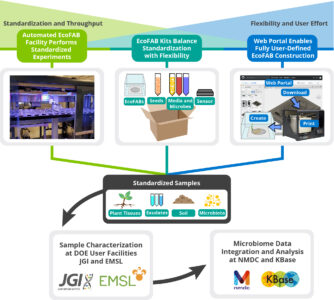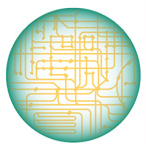National Laboratory Project: Lawrence Berkeley National Laboratory
- Principal Investigator: Trent Northen1
- Co-Investigators: John Vogel1, 2, Peter Andeer1, Karsten Zengler3, Kirsten Hofmockel4
- Participating Institutions: 1Lawrence Berkeley National Laboratory, 2U.S. Department of Energy Joint Genome Institute, 3University of California–San Diego, 4Pacific Northwest National Laboratory
- Project Website: ecofab-teams.lbl.gov
Summary

Fabricated Ecosystems. The use of fabricated ecosystems (EcoFABs) and standardized microbial communities can facilitate advancements in microbiome science by providing analysis of plant-microbe-soil interactions at user-defined levels of automation, standardization, and reproducibility. The TEAMs project, led by Lawrence Berkeley National Laboratory, is evaluating three different ways of disseminating fabricated ecosystems (EcoFABs) to users. These include (1) an automated, high-throughput system (left image), which provides the highest level of standardization and reproducibility, (2) EcoFAB “kits” that balance standardization with flexibility (middle), and (3) a Web Portal (right) that empowers the larger community to create their own EcoFABs. The standardized protocols used in these experiments make the resulting samples (plant tissues, root exudates, soils, and microbiota) compatible for analysis at DOE user facilities such as EMSL and JGI, which generate standardized data to populate the NMDC microbiome database. These data can then be analyzed in DOE’s KBase, a software and data science platform designed to predict and design biological function. [Courtesy LBNL]
